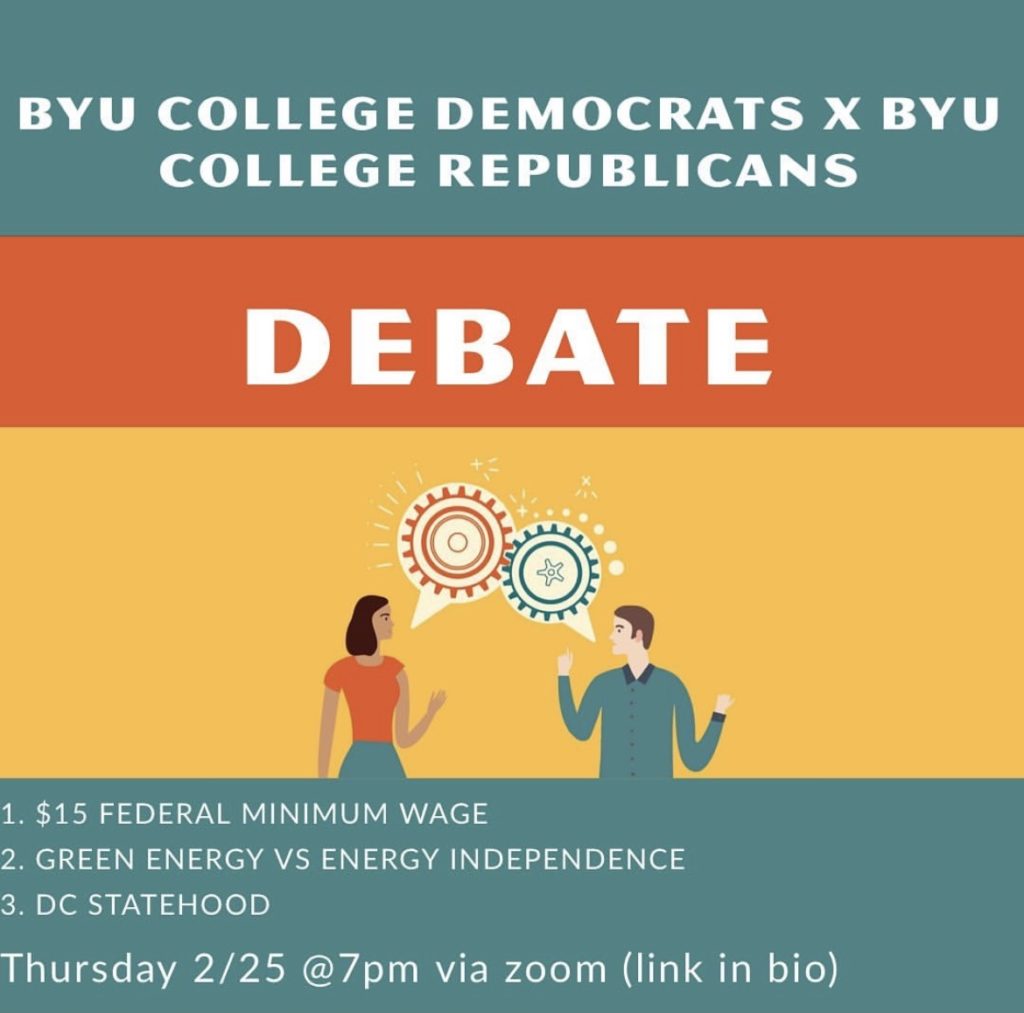
BYU College Democrats and Republicans went head to head to discuss Washington, D.C., statehood, $15 minimum wage and clean versus independent energy.
Club members debated over Zoom on Feb. 25. Debaters Josie Rackley, Alvaro Molina and Trenton Borders represented the left and Daniel Janes, Anne Wirthlin and Joshua Christensen represented the right.
Rackley and Janes discussed the proposal of Washington, D.C., as its own state. Rackley, a Democrat argued for it and Janes, a Republican argued against it.
Rackley said the will of the people in D.C. is not in line with the district’s current position of not being a state and they do not wish to join another state like Maryland.
“Regardless of political affiliation, D.C. citizens deserve representation,” she said. “The balance currently is skewed because 700,000 D.C. citizens are not accurately being represented, so statehood is unquestionably the right thing to do in a representative republic.”
Janes suggested D.C. citizens could be reabsorbed into Maryland because there would be certain bureaucratic obstacles with D.C. becoming its own state, he said.
“D.C. does have a government, but they leave much of the administration and infrastructure to the federal government that would have to be arranged before any statehood could be accomplished,” Janes said.
Molina and Wirthlin debated a $15 federal minimum wage. Molina, a Democrat, was for this with Wirthlin, a Republican, in opposition.
Wirthlin’s argument focused on what the increase would do for working mothers, disabled people and youth. “In order for businesses to have enough money to pay their employees with the new wage, they will have to cut jobs and that is non-negotiable.”
Molina gave statistics and said if the minimum wage was raised to $14.50, as opposed to $15, it would decrease poverty rates by anywhere from 22% to 45%.
“Taking the low end estimate of this data, that would mean that one fifth of people below the poverty line would now be above it,” Molina said.
Wirthlin rebutted by saying that minimum wage jobs, such as fast food, are not meant for people to support their families, but for youth looking to gain a job and experience. Workers are consenting to that wage and if it doesn’t suit their needs, they are free to find another form of income, she said.
“There are other options out there; you don’t even need higher education for a lot of them. But, you also have the opportunity to have higher education, and they are choosing instead to work minimum wage jobs,” she said.
Fast food workers in Norway and Denmark, however, make upwards of $20 an hour, Molina said. “This idea that minimum wage was only meant for certain people, or it’s not meant for parents is totally arbitrary.”
The debate also covered the benefits and disadvantages of clean and independent energy. Borders spoke in favor of green energy, with Christensen on behalf of energy independence.
Borders cited different journals and said over 100,000 premature deaths in the U.S. are tied to pollution. He then brought in local statistics in addition to the national figures he presented.
“Researchers at BYU even found that 75% of Utahns will lose one year of life due to air pollution. A full 23% of Utahns will lose five years of life or more due to pollution,” Borders said.
Transitioning to clean energy is the single most impactful step the United States can take to alleviate the harmful effects of climate change, he said.
Christensen agreed that climate change is a pressing issue but refuted by saying it is not about the magnitude of the issue, it’s about achievability. “We simply cannot by ourselves do anything to stop this problem.”
He noted that the U.S. is the number one producer of crude oil in the world and that if the U.S. is only responsible for 15% of C02 emissions annually, he questions what real impact the country will have in the grand scheme of reducing climate change.
Green energy solutions and independent energy are not always mutually exclusive, he said. “In the short term, that might mean fracking, but long term we can turn to nuclear energy or other solutions to maintain our energy independence.”




